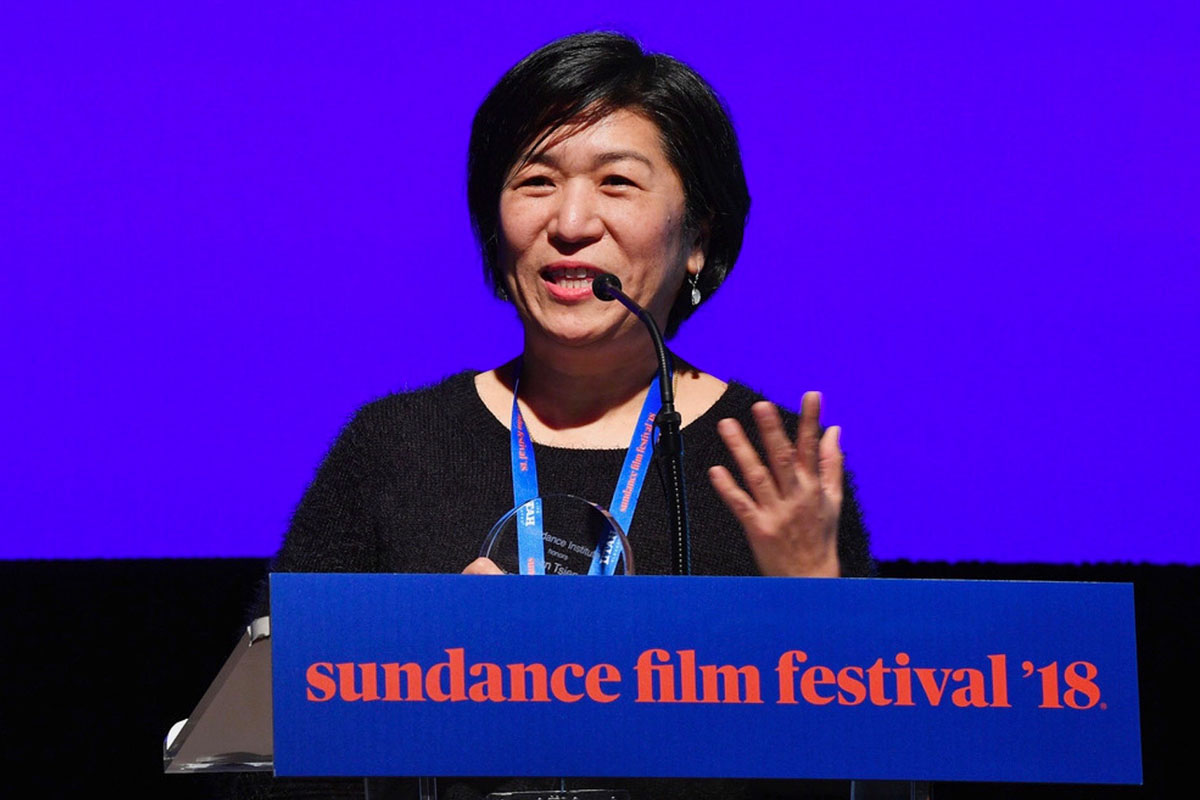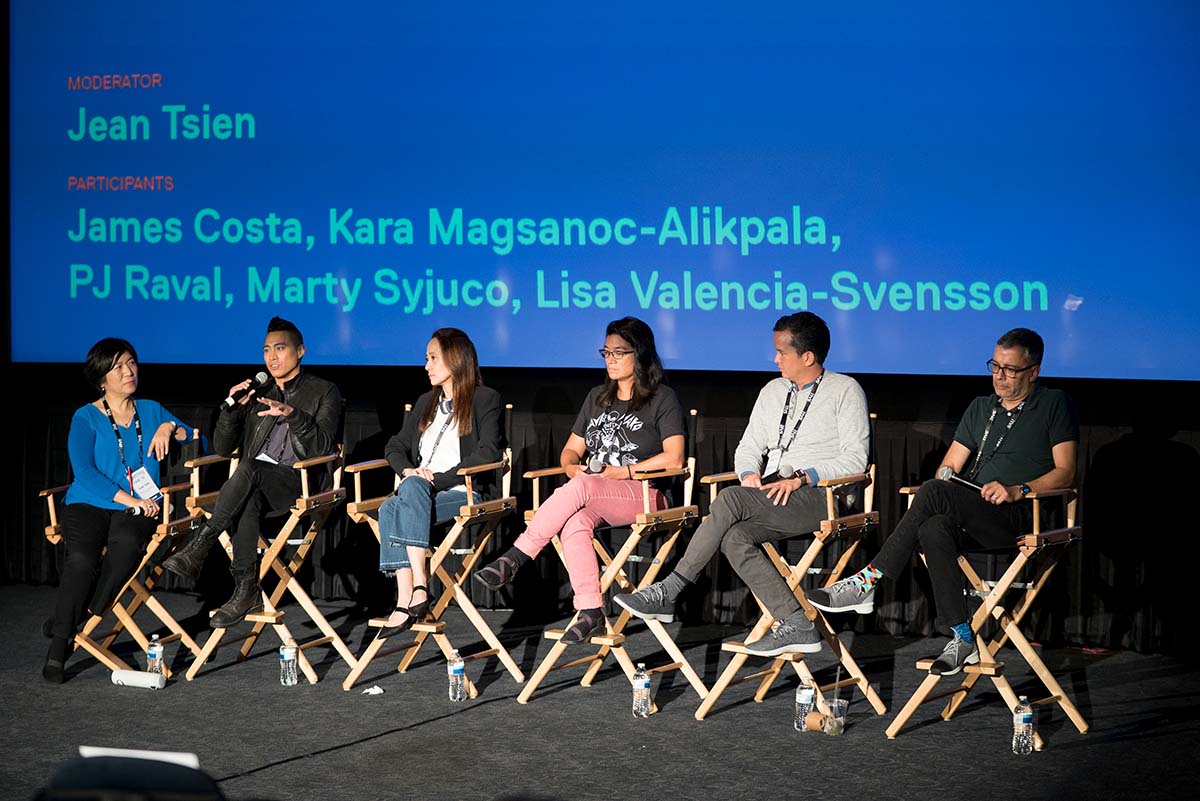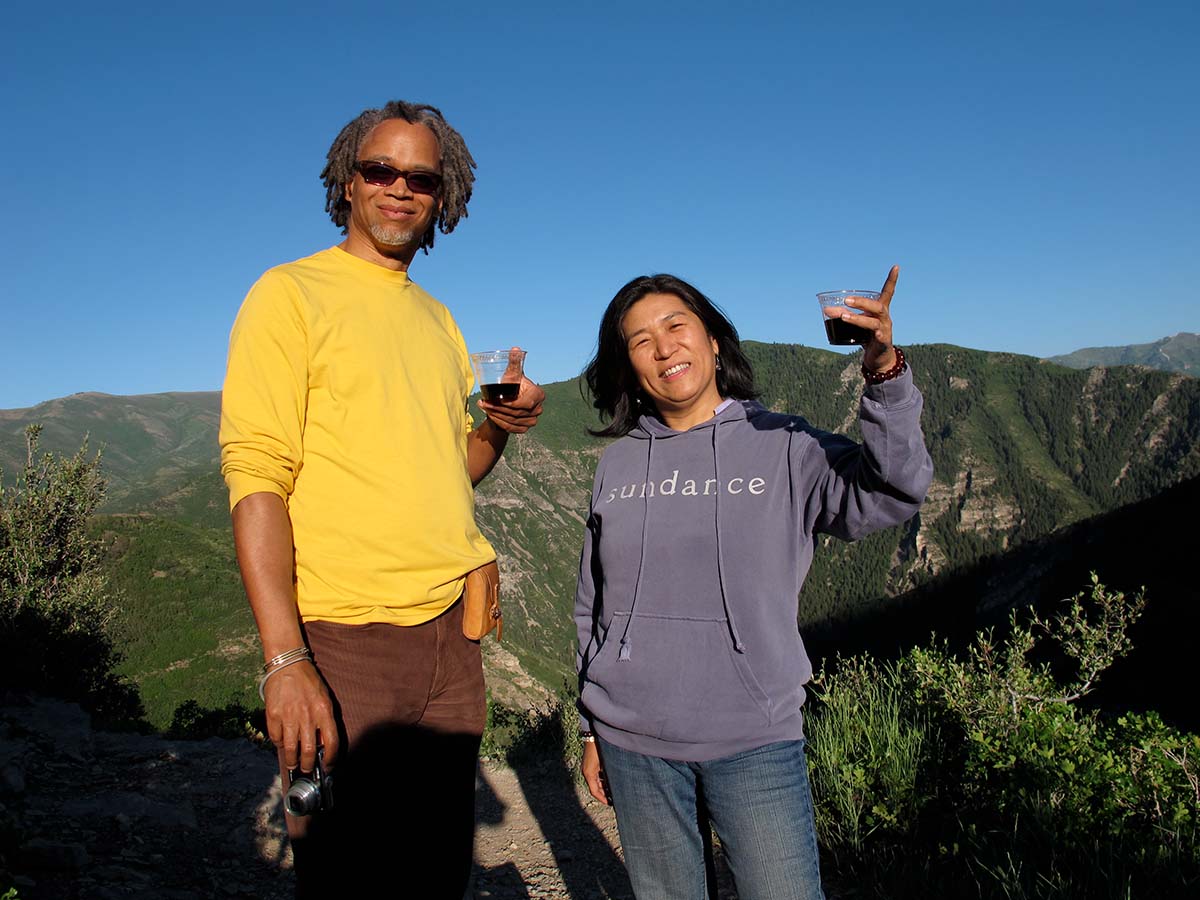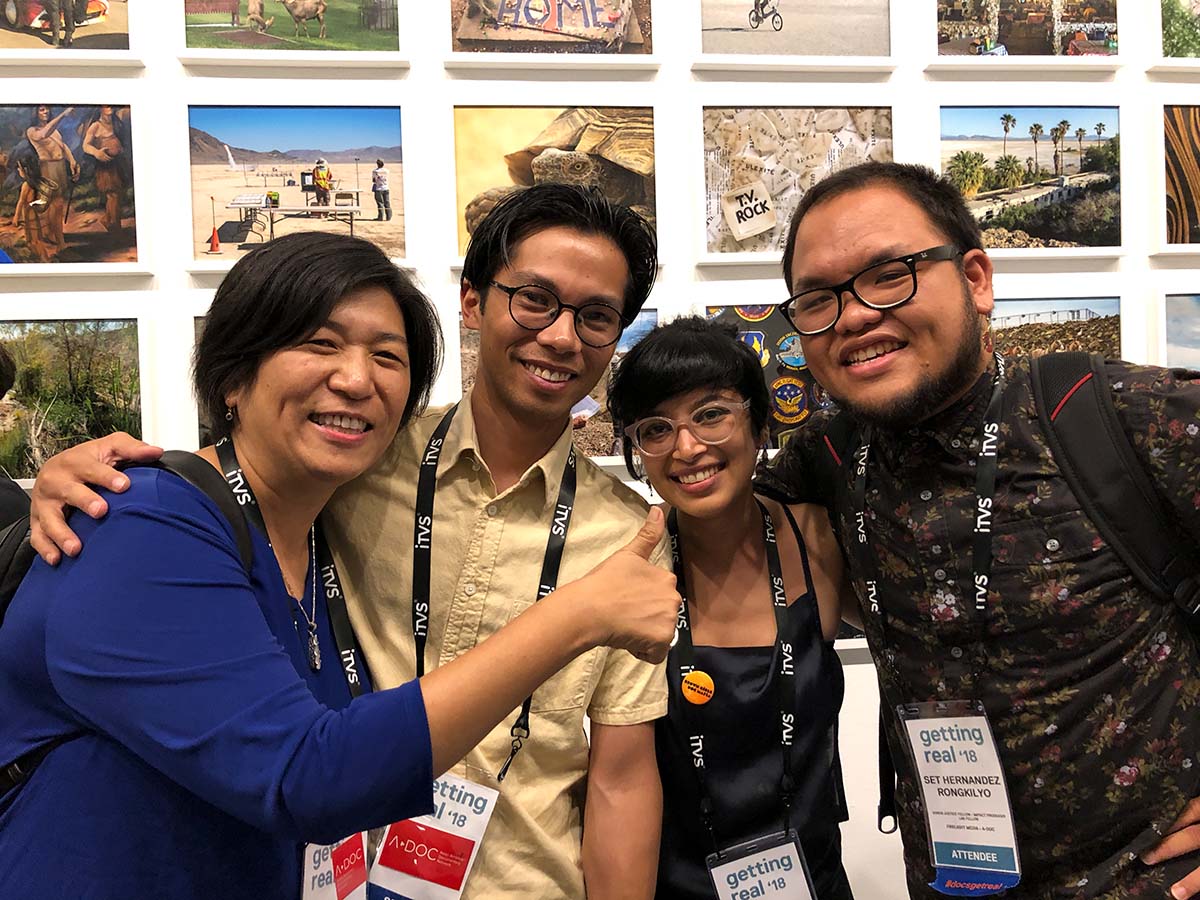IDA Pioneer Award Honoree Jean Tsien: An Immigrant's Instinct for Finding the Story

I always imagine Jean Tsien in constant motion, even though her work as an editor and producer usually means hours of sitting at a computer. Her films propel you through histories and lives with emotional force and intellect, and she crafts documentaries that are, at once, intimate personal stories and far-reaching interrogations into questions of race, politics and culture that have defined our times.
In her path-breaking 38-year career, Tsien represents the documentary field as a Governor of the Academy of Motion Pictures Arts & Sciences. She has edited for a master class-worth of documentarians including Orlando Bagwell, Barbara Kopple and Roger Ross Williams. More recently, she produced and executive-produced award-winning films such as Leo Chiang and Yang Sun’s Our Time Machine, Hao Wu’s 76 Days, and the docuseries Asian Americans. Her latest collaboration as producer and editor is Free Chol Soo Lee, by Julie Ha and Eugene Yi, which premiered in the US Documentary Competition at Sundance in January.
Tsien is known to invoke the ancestors and inspire new generations. She has mentored countless documentary filmmakers informally and with the Center for Asian American Media, Chicken & Egg Pictures (Egg)celerator Lab, CNEX Chinese Documentary Forum, IDFAcademy, and the Undocumented Filmmakers Collective, and she was honored with the 2018 Art of Editing Mentorship Award by the Sundance Institute. This year, IDA is honoring her with the Pioneer Award, in recognition of her “extraordinary contributions to advancing the nonfiction form” and her “exceptional vision and leadership to the documentary community.”
I caught up with Tsien at the office that she decamped to at the beginning of the pandemic: her mother’s basement in Queens. The linoleum floor has never changed since the family moved in during the 1970s, but on the shelf I spotted her Peabodys, an Emmy, and the 2017 Golden Horse Award (considered the Oscars of Asia) for Best Editing for the documentary Plastic China; Tsien competed with a slate of big-budget fiction features to win the prize.
DOCUMENTARY: Here you are with your Golden Horse in your mom’s basement. Jean, you’re destroying the illusion. If people read about you—editor, producer, Academy Governor, walking the red carpet—they would have no idea where you’re Zooming in from, unless your mom walks into the frame. You have this glamorous life, but then you’re still “Jean from Queens.” What keeps you grounded?
JEAN TSIEN: Maybe being an immigrant from Taiwan who had to leave everything behind. My father went bankrupt when I was in kindergarten and he had to immigrate to the US to look for work. So my brothers and I all grew up with our grandparents in Taiwan. I was 11 years old when my mom took the three of us to America to reunite with my father.
D. If you were editing the Jean Tsien biopic, would the story start there in Taiwan or here in the US?
JT: You’ve seen The Farewell, right? It would be like that scene where the car is pulling away and Awkwafina’s character is looking through the window at her grandma. That was the scene with my grandma. I remember my grandfather got her best buddies to come over and play Mahjong on the day we were leaving, because he knew they’d need to pull her back when we left. I remember the image so well; she was sobbing and her friends had to hold on to her. Yeah, just like The Farewell. Because my grandparents were the generation who fled from China to Taiwan after World War II and they already had to leave their home.
"I didn’t know who Studs Turkel was at the time, so I read his book Working. That’s when I just fell in love with nonfiction storytelling. That trip was life-changing."
- Jean Tsien
D: And then they had you. But then they lost you.
JT: It was a whole little unit leaving Taiwan.
D: You came of age during the 1970s in the Bronx, and it sounds like your family really struggled. Your mom worked as a cashier, your dad was a cook and all the kids pitched in. It’s a familiar immigrant story for that time, but you ended up following an unconventional path.
JT: I always loved visual art, and I got into the LaGuardia High School of Music and Art, aka “The Fame School.” It was the best public school education for an FOB—that’s “fresh off the boat”— like me. But then I realized I wasn’t going to make a living as an artist, and so I took more practical classes like architecture and photojournalism. I chose NYU film school for college because I received great financial aid since my parents were low income. I was paying about $800 per semester at NYU.
D: Are you the only person in history who went to NYU film school because it was cheaper? Were there other Asian Americans there?
JT: I was the only Asian American in my undergrad class. I was living at home and commuting to film school; I also worked my butt off with work-study jobs. In my junior year I started hanging out with other Asian graduate film students, and that’s how I ended up going on a cross-country road trip to shoot East to West.
D: That road documentary, East to West: America through the Eyes of a Chinese [1984], really belongs in the annals of American independent cinema history. It was made by a remarkable group of young filmmakers who would become major figures, including producer Janet Yang [Joy Luck Club, Over the Moon], the experimental filmmaker Shu Lea Cheang [Fresh Kill] and Ang Lee [Brokeback Mountain]. And of course, you! How did you get involved?
JT: I was filming news footage at a writers’ conference, and Janet saw me shooting with a hand-cranked 16mm Bell and Howell camera. She was producing the film and she introduced me to the director Yaping Wang, who had gotten equipment from the UCLA film department to make a film driving across the US. So, I pulled the troops together. I recommended Eric Lau to be the DP, and Ang Lee the sound man. I was the assistant cameraperson, Shu Lea the line producer. She also performed magic with instant ramen—five weeks of eating instant noodles almost everyday with fermented tofu and kimchi.

D: I would have given anything to have had a camera on that set to film behind-the-scenes of the crew. You guys would all be in the outtakes, right?
JT: Many times the camera panned to Ang Lee; we would have to tell him, “Get out of the shot!” I remember he would be sitting there daydreaming. We interviewed the writer, Studs Turkel in Chicago. I remember he took us out to his home and we had Peking duck. It was one of our better meals. I didn’t know who Studs Turkel was at the time, so I read his book Working. That’s when I just fell in love with nonfiction storytelling. That trip was life-changing.
D: Is that why you became an editor, because shooting on location was so grueling?
JT: Actually, it’s because I took an experimental film and animation class, and then an editing class with Paul Barnes. He opened the door for me. One evening he was showing Bonnie and Clyde, and the way he talked about the film blew me away. So I wrote to Paul after my final exam, “If you know anyone who is looking for an editing intern, please let me know.” And I got a call from the late Sally Jo Menke. Through Sally I got my first assistant editing job, on a 35mm short, and then at CBS Reports with Bill Moyers. And I joined the union. My life changed again when I got to work with the editor Larry Silk, who’s legendary. I’m very proud of my editing lineage.
D: What really comes across in your work is a sense that you’re discovering the story at the same time as the audience. You’re being transformed in some way. Can you talk about Malcolm X: Make it Plain [1994]?
JT: I got a call from Orlando Bagwell and he was looking for an editor of color to cut Malcolm X: Make it Plain for Blackside Productions in Boston. I showed up to the interview and I told him, “I’m on chapter one of The Autobiography of Malcolm X. I have to tell you, I love what I’m reading. But I don’t know anything about him.” I remember the look on Orlando’s face. He basically closed the binder he was taking notes on.
D: And you thought it was over?
JT: I knew it was over. And he asked me, “Okay, just tell me a film that you liked.” I didn’t watch that many documentaries back then, but I told him I watched a short film he’d probably never heard of, called Sewing Woman [by filmmaker Arthur Dong]. We talked for another hour after that, and he told me later on, “The reason I hired you was not because of your skillset, but because of your passion for storytelling.”
"I don’t see myself as being a pioneer. I see myself as an immigrant like the Undocumented Filmmakers Collective, and the Dreamers, right? They’re the pioneers; they’re so courageous."
- Jean Tsien
D: A book you had read growing up was the Chinese-language version of Gone with the Wind that your aunt gave you. I grew up loving that story too, until at some point I realized I was being brainwashed to glorify the Confederacy.
JT: Exactly. You see, we don’t know until we learn these things. When I was working on Malcolm X, here I was, a Chinese American editor and pretty naive. I remember I learned this from Sandra Christie, my closest friend, who was my assistant at the time. She is Jamaican-American. I had cut in a shot of a Black man drinking something in a brown paper bag in a montage of Harlem. And she said, “You can’t put that in there.” I said, “Why not? He’s drinking.” In my mind, he could be drinking juice or soda. She said, “No, when you pick an image like that, you have to be really careful with the context.” I had to learn that; that’s not something that comes naturally to any of us. We have to learn about racism. It was ignorance, but once you learn it, you understand.
D: You learn the power of the image and the whole politics of race.
JT: Yes, and I’m forever grateful to Orlando for taking that risk with me with Malcolm X. In Chinese, we have a word for those who change a life: “Gui Ren.” I have many of them in my life like Orlando.
D: At this point you had only recently moved from assistant editor to editor. That must have been nerve-racking, since Orlando took such a big risk hiring you.
JT: Actually, there was a time when Blackside really wanted to fire me. I didn’t even know until later. We had a great screening of the assembly edit, but when it got to the rough cut, it was four hours long and it was a disaster. Peter McGee from WGBH was sitting in the first row, and at one point I turned around and he was out cold. I still didn’t know my head was on the line, though.
But Orlando and Judith Crichton, who was the executive producer of American Experience, really fought for me. She came in and said, “Okay, you’ve got to tell all the cooks to leave the kitchen. Let’s work on the first reel; just you and Orlando figure it out.” What I realized is, I cannot just structure the film chronologically, I need to bring the most powerful moment. Like Malcolm’s angriest moment, at the very beginning. Once I found that, I showed it to Judith. She came in, and this is what I learned a great executive producer should do. She watched it for 30 minutes and when I stopped the Steenbeck [a 16mm editing table], she smiled at me. And I knew it was working.
I learned the most important lesson as an emerging film editor: You have to trust your own instinct and find your own voice in a very crowded room. Also, once you have the context of the story, you must approach the film from an emotional level. That’s something from the gut and your heart, and it takes time to discover it. That’s also when I learned that once you give people confidence, they can move forward. Now that I’ve taken on the role of an executive producer, I carry Judy’s wisdom and smiles in my heart.

D: I first worked with you soon after Malcolm X, on another Asian American road documentary, My America: Or Honk If You Love Buddha [1997]. Then we worked together some 20 years later on the PBS docuseries Asian Americans. Talk about grueling! You were flying back and forth from New York to Los Angeles, taking care of your mom and trying to get this five-hour monster finished before the May 2020 airdate.
JT: Wow, that was only two years ago, but it feels like 20. The scariest moment for me was on January 28. I flew back to prepare for the narration recording with Daniel Dae Kim. I looked at my mom over the Nest camera and I saw that she was on the couch. Non-responsive. I knew something was seriously wrong. I had to call my brother and navigate the EMTs over Nest to talk them through the house, to get to her. I thought, “Oh my God, my mom’s alone, I have this five-hour project to finish. How do I navigate?”
I do a lot of prayers. I do Reiki. I do everything. And I also believe our ancestors will help. So I flew back to New York to take care of my mom, and I was able to work with the narration remotely with Daniel Dae Kim. Then in February I flew back to LA the very last time to finish post on the Asian Americans series, and my brother said, “Take some masks with you just in case.”
D: So here’s a picture in March of 2020, we’re trying to finish the mix at a post house in Santa Monica…
JT: That was a Wednesday. I remember I had dinner with [filmmaker] Yung Chang and it was pre-pandemic, everybody was still sharing food. And then the next day our mixer Joe Milner, who’s very cautious, was saying, “I can mix remotely from Palm Springs,” where he lived. He wanted to go home. This was the first time, then there was no hugging anymore. I left on the first flight out. It’s that refugee instinct, or immigrant instinct. You pack everything, you’ve just got to act on it and you do it. You just go. Everything was on lockdown. I have to say, Eurie Chung [Executive in Charge of Production] and Travis Hatfield [Series Online Editor] really delivered; they finished all the post remotely and on time. It was like putting a thumb in the dam.
And what was just so unreal and unthinkable was that, for those past two years, we were working together on this history of anti-Asian hate. You’d never think that this would ever happen in your lifetime. Of course, there’s always racism but then this anti-Asian hate started around the world. That’s something that was just unthinkable.
D: You managed to continue making films throughout the pandemic, working from your mom’s basement. You produced Hao Wu’s 76 Days, which documented the outbreak of COVID-19 in Wuhan, China. That film was telling our own future in real time just as the pandemic was rolling out in the US. We also have to talk about your latest documentary that just premiered in competition at Sundance, Free Chol Soo Lee. It was directed by first-time feature filmmakers Julie Ha and Eugene Yi, and it also really speaks to the third act of your career as a mentor.
JT: I met Eugene in 2015. I was interviewing him as an editor for a friend of mine. Within 15 minutes of our conversation I said, “I’m not going to hire you as an editor; you should be a director.” And then I just happened to be a mentor at the CNN Tribeca Camden Film Retreat, which is a rough-cut retreat. That’s where I met Julie Ha, and then soon after the retreat, they asked me to be their executive producer.
I have to say, this is what makes me do what I do. First, Aldo Velasco edited [the film] and then I finished the cut this past fall. We took a long shot and submitted it to Sundance. When Julie saw that cut, she called me sobbing, “I cannot imagine my vision can now be seen.” That’s an editor’s best feedback. You helped your director fulfill their vision to the point they can’t even imagine. That’s the surprise, that’s the unknown and that’s the beauty of documentary. It’s why I didn’t go into narrative film.

D: I always say, at a certain point in a cut, the film starts speaking back at you and tells you what it’s about.
JT: I wanted to discover it, like what Judy told me: The film is there, but you just have to find it. This is why I love editing.
D: Looking back on your career as a pioneer editor, transnational producer, and now mentor to documentary filmmakers in the US and Asia, what strikes me is the way you’ve taken on projects that are emotionally connected to your own life.
JT: I don’t see myself as being a pioneer. I see myself as an immigrant like the Undocumented Filmmakers Collective, and the Dreamers, right? They’re the pioneers; they’re so courageous.
D: But if you had come to the US in the 1940s instead of the ’70s, you would have been undocumented. The Chinese Exclusion Act didn’t end until 1943.
JT: Actually, even during the time I was growing up in the Bronx in the ’70s, I remember the times my mom would come home so distraught because Immigration came to raid the restaurant where my parents worked. When my father worked in a restaurant in Connecticut, there was a back door they would use. If Immigration came through the front door, there was an escape route to the parking lot because they came so often.
That’s why stories in Asian Americans really touched me—the stories about families who were separated at Angel Island and at the Japanese American incarceration camps. It touched me because my father left us [in Taiwan] when I was little. I didn’t really spend time with him until I came to America five years later. And to tell you the truth, we never really got along after that. This is why the whole separation of children in the past and what’s happening on our border today is so destructive. Knowing that, having that experience makes me want to work on a film.
When I started out 40 years ago, there were just a handful of us Asian American filmmakers working in documentaries. That’s why I want to nurture young filmmakers. Very original voices. I read Set Rongkilyo’s proposal; they’re part of the Undocumented Filmmakers Collective. They’re really taking the form away from the formulas, and that’s the excitement—how new voices can change the documentary too. Someone had to take a chance on me. So I want to give that chance back to others.
Renee Tajima-Pena is an Academy Award-nominated documentary filmmaker whose credits include Who Killed Vincent Chin?, My America…or Honk if You Love Buddha, Calavera Highway, No Más Bebés, the Asian Americans docuseries, the May 19 Project and other films on themes of immigration, race, ethnicity, gender and social justice. She is Professor of Asian American Studies, Director of the Center for EthnoCommunications at UCLA.
